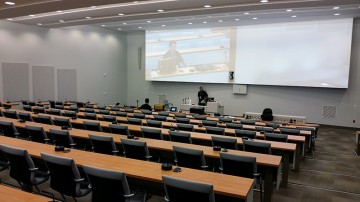Since the MD undergraduate program began its expansion ten years ago, videoconferencing facilities have played a key role in bridging the geographical divide between learners and faculty in different regional programs.
While all educational facilities require careful planning and upkeep, videoconferencing facilities require additional attention in order to accommodate their unique requirements (such as sound design, network connections, and technology obsolescence). MedIT’s Capital Infrastructure Program, comprised of technology, facilities, and project management experts, ensures that UBC Faculty of Medicine videoconferencing facilities get the additional attention they need.
The team works with the Faculty of Medicine’s Facilities team, in partnership with academic and health authority partners, to create and maintain the lecture theatres, seminar rooms, and labs that act as sites of collaboration and learning. They also manage the refresh cycles of infrastructure, including the Distributed Medical Program Audio-Visual network.
The new and the new-again

New 120-seat lecture theatre at Surrey Memorial Hospital’s Critical Care Tower.
In the last year, the team has consistently delivered new videoconferencing facilities on-time and on-budget across six health authorities. These spaces support lectures, team-based learning, clinical skills, and medical simulations.
Some examples of their work can be found in the new Critical Care Tower at Surrey Memorial Hospital, which is now equipped with a 120 seat lecture theatre, small videoconference-enabled seminar rooms, clinical skills and simulation spaces, as well as the eduroam wireless network. As one of the fastest growing cities in the province, Surrey is an important location for researchers and new physicians. The videoconference- and wireless-enabled Faculty of Medicine space will allow them to learn and work directly in the community.
In addition to a number of new rooms, a dozen teaching spaces were renewed this past year, including three rooms located in the busiest videoconferencing site in the Faculty – the Gordon and Leslie Diamond Health Care Centre. Room renewals ensure the ongoing quality of service for distributed medical education by replacing equipment before it is likely to fail, and by implementing new room designs that facilitate collaborative learning and engagement. The renewals also provide opportunities for the team to use new flexible technology solutions that are lower cost and higher quality than their predecessors, often improving the ability of the Faculty to meet educational and administrative needs.
Future growth
As medical education continues to expand to accommodate population growth in BC, the team will continue to manage the creation of new videoconferencing spaces, and the renewal of existing ones. In the next year, the team will work on new Faculty of Medicine spaces in Kamloops, Vernon, Penticton, Prince George, Campbell River, Comox, Prince Rupert, Vancouver and Victoria. They are also aiming to accelerate the implementation of eduroam, which provides wireless access to meet educational needs in clinical sites.
Their continued efforts will help enable to Faculty to fulfill its commitment to transformative learning across its four program sites.
Related: